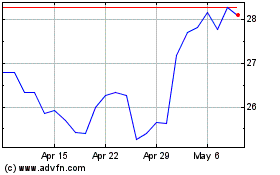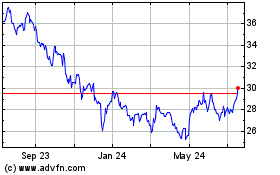By Jared S. Hopkins and Dave Sebastian
New drugs powered Pfizer Inc.'s fourth-quarter sales, a sign the
drugmaker's effort to remake itself as a smaller company relying on
its own laboratories for growth is starting to emerge.
Sales of the New York-based company's patent-protected medicines
rose 7% to $10.5 billion. Among the products notching big gains
were blood-thinner Eliquis, which posted a 21% increase in
quarterly sales to $1.1 billion, and breast-cancer therapy Ibrance,
whose sales increased 13% to $1.3 billion. Newly approved
rare-disease drug Vyndaqel topped analyst expectations with $213
million in sales.
The company recorded a net loss of $337 million, or 6 cents a
share, compared with a loss of $394 million, or 7 cents a share, a
year earlier. Excluding one-time items, the company reported
earnings of 55 cents a share, missing the 58 cents a share analysts
were expecting.
Shares in Pfizer were down 5.2% on Tuesday afternoon. Analysts
attributed the stock's decline to the earnings miss and a sales
forecast that investors hoped would be higher.
Pfizer, one of the world's biggest drugmakers by sales, is
trying to turn into a smaller but faster-growing drugmaker focused
more on novel, patent-protected medicines for diseases such as
cancer with bigger sales-growth upside.
To further the overhaul, Pfizer agreed last July to combine its
Upjohn off-patent drugs business with Mylan NV. The deal, which
would create a company called Viatris, is expected to close in the
middle of this year.
If its strategy pays off, Pfizer could see sales rise faster
than they have in years. Yet the plan is risky, especially without
the safety net that the steady cash flow from off-patent drugs
provided.
Many experimental therapies don't make it to market, and their
development requires heavy investment. Pfizer spent $2.8 billion on
research and development in the fourth quarter, up 15% from the
same period a year earlier.
"I'm very, very pleased with the way things are evolving," Chief
Executive Albert Bourla said in an interview. "We have taken steps
-- very deliberate steps -- to transform Pfizer."
For 2020, Pfizer targets adjusted earnings of $2.82 to $2.92 a
share on revenue of $48.5 billion to $50.5 billion. Reflecting
Upjohn's coming combination with Mylan, Pfizer forecasts adjusted
earnings of $2.25 a share to $2.35 a share on revenue of $40.7
billion to $42.3 billion. Pfizer said it doesn't plan to make any
share repurchases this year.
Overall, the drugmaker on Tuesday posted $12.7 billion in
fourth-quarter sales, off 9.3% from $14 billion a year earlier.
The drop occurred in part because of the absence of revenue from
the consumer health-care business, which was combined with
GlaxoSmithKline PLC's in a joint venture last August.
It was also tied to a sales decline of nearly one-third in
Pfizer's Upjohn segment. Pain pill Lyrica began to face generic
competition last year, and sales fell 67% to $433 million for the
quarter.
Chief Financial Officer Frank D'Amelio said during a conference
call Pfizer is negotiating with Mylan for it to also take on two
additional Pfizer subsidiaries when the merger closes: one that
manufactures auto-injector products such as EpiPen, and a
partnership with Mylan that makes generic drugs for the Japanese
market.
The segments posted combined sales of nearly $600 million last
year.
After the deal closes, Pfizer will be more dependent on its
pipeline of experimental therapies. This year, the company expects
to announce results from as many as five late-stage studies and to
begin as many as 10 late-stage studies.
Pfizer has targeted 2022 for U.S. approval of 15 new drugs or
indications that have the potential to generate $1 billion in
annual sales.
The company said Tuesday that this year it hopes to start
late-stage studies testing its gene therapies for blood disease
hemophilia, and Duchenne muscular dystrophy, a disease that weakens
muscles and organ function.
Mr. Bourla identified gene therapies as a Pfizer priority. "They
are very, very crucial for us," he said. "We believe they are the
future of science right now."
He added that the company continues to look for small and
midsize deals for drugs in mid-to-late-stage development to
complement its laboratory deals, but anything larger could be
destructive to its strategy.
Pfizer executives said they also expect growth from biosimilars,
lower-price copies of branded biologic drugs. Sales of Pfizer's
biosimilars totaled $911 million last year, up 19%. Pfizer in
recent weeks brought to market two cancer biosimilars, with plans
to launch another next month.
Write to Jared S. Hopkins at jared.hopkins@wsj.com and Dave
Sebastian at dave.sebastian@wsj.com
(END) Dow Jones Newswires
January 28, 2020 15:20 ET (20:20 GMT)
Copyright (c) 2020 Dow Jones & Company, Inc.
Pfizer (NYSE:PFE)
Historical Stock Chart
From Mar 2024 to Apr 2024

Pfizer (NYSE:PFE)
Historical Stock Chart
From Apr 2023 to Apr 2024
